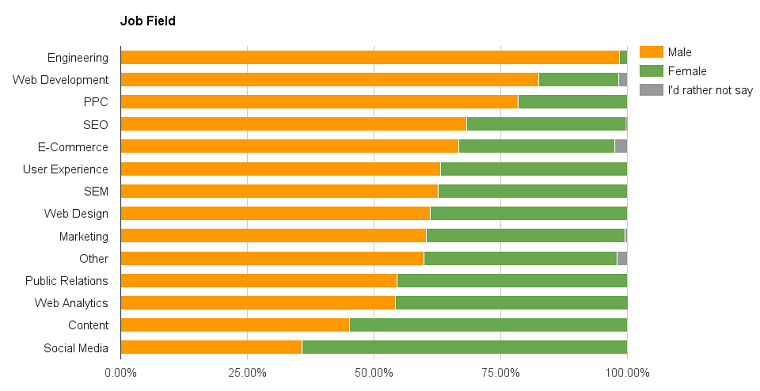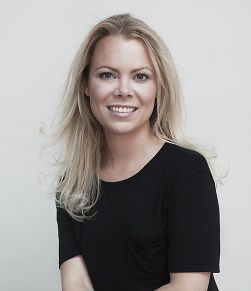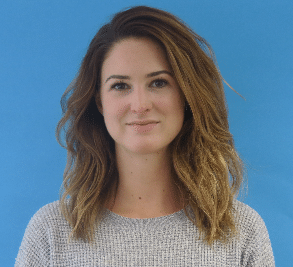Like many tech and tech-adjacent industries, SEO is a largely male-dominated field.
Relatively few statistics exist on the exact gender split within the search industry, but a Moz 2015 Online Marketing Industry Survey put the percentage of men working in SEO at close to 70%.
SEM was a little more even gender-wise with around 60% men working in search marketing, while PPC was even more male-dominated, with the survey finding that some 80% of PPC professionals were men.
 Image: Moz
Image: Moz
Even without the numbers, it’s fairly obvious to anyone who works within SEO that it’s a majority male industry – from the speaker line-ups at events, to the rosters at companies, to the bylines on industry blogs.
This isn’t to say that there aren’t plenty of hugely successful and brilliant women working in SEO, because there are. But there are still comparatively fewer of them.
What do the women who work in SEO think about the gender division within the industry? Do they notice it or feel that it affects their work? Do they think that women in SEO need to do anything differently to stand out? And what advice would they give to other women working in the field?
In honor of International Women’s Day 2018, we wanted to highlight the perspectives of women working in SEO, and how – if at all – they think gender affects the industry and the work that they do. Search Engine Watch spoke to eight successful ladies in SEO to find out their thoughts and advice on being a woman in SEO.
Sam Charles, Founder of Float Digital
 Sam Charles is an SEO consultant with more than seven years’ experience working in the digital industry.
Sam Charles is an SEO consultant with more than seven years’ experience working in the digital industry.
In 2016 she founded her own agency, Float Digital, which aims to demystify the art of SEO for businesses, particularly small businesses. She has been nominated at the UK Search Awards, and featured in The Drum’s ‘50 under 30’ list in 2017, which celebrates young women making waves in digital industries.
Charles got her start in SEO in her early twenties after studying advertising at university, working first at a branding design and web development agency, before moving on to manage the marketing at Australia’s largest professional haircare and skincare company.
“Nobody really told me what SEO was but my daily tasks revolved around blogger outreach and creating content based on keywords,” Charles recalls. “Once I moved back to England in 2012, I picked up the first copywriting job I could find, and it was only then, I was introduced to the lovely world of SEO, and suddenly everything I had been doing made sense.”
Charles says that she didn’t initially notice the gender disparity in digital marketing, as her first few jobs were at companies that had plenty of women on their payroll. “It was only when I moved away from content creation and focused on improving my technical SEO skills, that I felt I was in a male-dominated industry,” she says.
“Attending events such as Brighton SEO and engaging with communities online, it’s clear there are more men working in SEO than women.”
However, Charles doesn’t feel as though her gender has been a hindrance in the industry – possibly because her name makes people assume that they’re working with a man. “Too many times I’ve turned up to a meeting or answered the phone and I’ve been greeted with “I thought you were going to be a man”.”
With that said, she emphasizes: “People’s respect for you isn’t based on gender. The last few agencies I’ve worked in have celebrated women, and this sentiment is echoed in online circles, too.”
Charles says that the advice she would give to women in SEO wouldn’t be any different to the advice she would give anyone else getting started in the industry. “There’s no tips or advice I would give to women in SEO because we, as women, are no more or less than our male counterparts.
“Male or female, if you work in SEO there are two pieces of advice I’d offer: learn every day and be completely fearless when it comes to engaging with online communities, speaking at events or chasing clients.
“That said, to me, there’s nothing more empowering than meeting other women in search. There are meetups and lunches especially for women in business, digital or SEO. If this sounds like something you’d benefit from, do a quick search in your area and go along to one. Every event like this I’ve been to has been so welcoming.”
Dewi Nawasari, European Head of SEO at Monster
 Dewi Nawasari is a hugely experienced SEO with close to twelve years of industry work under her belt. She jumped straight into SEO as a graduate with a degree in Business Supply Chain Management, landing a job as a Natural Search Optimization Analyst doing link-building for an agency. From there, she worked her way up the industry, and is now the European Head of SEO at recruitment company Monster.
Dewi Nawasari is a hugely experienced SEO with close to twelve years of industry work under her belt. She jumped straight into SEO as a graduate with a degree in Business Supply Chain Management, landing a job as a Natural Search Optimization Analyst doing link-building for an agency. From there, she worked her way up the industry, and is now the European Head of SEO at recruitment company Monster.
Nawasari reflect that SEO was “not the easiest industry to start in” as a woman. “I remember at the earlier years of my career, coming to any industry event and being one of the few women who attended.
“There were occasions when I was not heard or taken as seriously as the men in my then-workplace, who had formed their exclusive circle of authority. But by the same token, I was really lucky to have also came across men in the industry who confided in my ability purely as a person. They are now some of my dearest friends.
“Do I think women have to do anything differently in order to stand out? The answer is yes and no.
“Yes, because I think women have to stop selling themselves short and start communicating their brilliance and expertise with one hundred percent confidence. Being willing to make mistakes or say something wrong is the only way to find success!
“No – because women should just be women. Never think that you have to fulfil certain stereotypes in the industry.
“Women tend to be quite humble about our achievements, and refuse credit beyond what we feel we deserve. This quality truly brings balance to any workplace because when women are part of the team, they make sure that the team work together to a high standard of performance.”
Nawasari’s advice for other women trying to make their way in the industry is, “Being credible, humble and over-communicating are your weapons.
“Even when you have a slightly rough start to the career, always ensure that you research, analyse, and know your work inside-out before presenting it to anyone. Once you have presented your work, share and over-communicate it – do not sell yourself short! Keep at it and you’ll be incredibly proud when you climb the ladder because of pure merit.
“Oh, and of course, don’t forget to congratulate and clap hard when you see a fellow woman succeed!”
Amanda DiSilvestro, Writer for HigherVisibility and Marketing Manager at Workshops for Warriors
 Amanda DiSilvestro has spent seven years working in the marketing industry as a content editor, writer and marketing manager, and is one of the most popular and prolific writers here at Search Engine Watch.
Amanda DiSilvestro has spent seven years working in the marketing industry as a content editor, writer and marketing manager, and is one of the most popular and prolific writers here at Search Engine Watch.
She got her start in the industry through content marketing and worked her way up to a management position in SEO. “While it took several years, I found it to be a great foundation and path forward,” DiSilvestro says.
“I have found throughout my career that ghost writing opportunities are plentiful, and while this is a great way to really dig into SEO and learn the industry, it’s important to balance ghost writing with writing under your own byline. In short, don’t get too comfortable writing for other people – I see this happen all the time!
“Big websites like Search Engine Watch can seem intimidating, but if you reach out and express your passion for the topic and desire to write with your own byline, even if you don’t have years and years of experience, you will find success. At a certain point, it turns into a domino effect and you get more and more opportunities to show off your expertise through content writing.
“The community of women SEOs is great as well, so don’t be afraid to reach out to those you admire.”
Lexi Mills, Managing Partner at Shift6
 As a specialist in both PR, a typically female-dominated field, and SEO, a largely male-dominated field, Lexi Mills has a unique perspective on gender in her professional life – she is simultaneously in the majority, and the minority, in both of her intersecting fields.
As a specialist in both PR, a typically female-dominated field, and SEO, a largely male-dominated field, Lexi Mills has a unique perspective on gender in her professional life – she is simultaneously in the majority, and the minority, in both of her intersecting fields.
A digital marketing expert who has won multiple awards in the course of her career, Mills got her start in digital marketing as a graduate working in the Brighton nightlife industry, who convinced the company director to let her manage the company’s marketing and promotion online.
“I learned SEO way before I even knew what SEO was,” she recalls.
Working as a woman in the digital marketing industry, Mills says that she wasn’t always aware of whether people were biased against her because of her gender. “I have a couple of other biases that I have to champion – I’m very petite, I’m female, and I used to look very young for my age.
“Ageism was probably a bigger issue for me – when you’re someone who has worked super hard to get super good at something, and you walk into a room, people think, ‘I don’t want a kid working on this.’ Those were far bigger issues for me.
“I’m sure there was gender bias, but I tended to put things down to those issues a lot more.”
When she ran up against bias in her work as a professional SEO, Mills says that she found it more effective to approach the situation with gentle humor, which tended to be more successful in swaying people’s unconscious prejudices.
“By choosing to believe that people meant well, that they didn’t mean to be biased – even when they were – it changed how I dealt with them.
“I would walk into a meeting room with a client, and someone would say, ‘Oh, I’ll have a tea! And I’ll have a coffee, two sugars!’
“I would go and get the teas and the coffees, come back in, put the tray down, and say, ‘Guys, I specialize in SEO and PR, but I’ve done my very best with the tea and coffee.’
“And these guys would look mortified! But then I’d giggle, and I’d laugh with them – because the reality is, their assumption that their SEO specialist was going to be male and older is actually statistically correct; and these are statistically-driven people. You could say it was gender bias, but it was a statistically accurate assumption to make.
“And instead of me getting angry about it, if I made them giggle, there was a bond that formed – because they didn’t mean it. Or I chose to believe that they weren’t intending to be biased. And they probably came out not thinking that the next time they walk into a meeting room, they’re going to order tea and coffee off a young female, presuming that they’re not the specialist.”
Mills stresses that she has never identified as a “woman in search” or a “woman in tech”, preferring to think of herself as a “person who works in search”. Nevertheless, she believes that women in the industry have to be more aware of how they present themselves, as this can sometimes cause them to meet with more resistance professionally.
“At least five years ago, if you got up on stage wearing a bright pink dress, that would have caused a bunch of fairly unpleasant tweets,” she says. “It makes you look different.
“And while there’s nothing wrong with someone wanting to wear very feminine clothing – at all – it might mean they have to fight a little harder. And maybe they want to put that energy into doing such awesome work that they’re subconsciously changing people’s perception of women.”
She also advises women in the industry to “recognize when it’s time to move rooms. If the room you’re in is biased – go make a better room.
“I move between different projects with different clients, and sometimes I’ll fight that battle, but other times I just think, ‘Hey. I’m going to go to your competitor and kick ass.’”
“As women, the way we’re socialized from a young age means that we develop different language behaviors, different ways of doing things – and that’s okay. You should take those advantages, and play to your strengths.
“Take stock, give back, help others, and be fierce.”
Chelsea Blacker, Co-Founder and Managing Director of BlueGlass
 Chelsea Blacker is a hugely experienced digital marketer and the Managing Director of SEO and content marketing agency BlueGlass.
Chelsea Blacker is a hugely experienced digital marketer and the Managing Director of SEO and content marketing agency BlueGlass.
She has worked in SEO for more than 10 years, and got her start in the industry doing SEO for a small personal blog at university, before becoming the assistant to an SEO consultant – at which point, she says, “I was hooked!”
On gender in the SEO industry, Blacker observes, “The SEO community is extremely fair compared to other industries like investment banking or entertainment.
“People respect each other for sharing knowledge, explaining findings, and asking boundary-pushing questions. I have never worried that being female has a negative correlation to thriving in SEO.”
Her advice to other women working in SEO is to make sure their voices are heard – and on a practical level, to not shy away from the technical side of SEO.
“If you’re the only woman in a room, it’s a good room to be in. Participate with value added words (not chat) to prove your voice is worth listening to so you don’t get left out of conversations.
“Celebrate technical learning, don’t avoid it; if you feel out of your depth, it’s a good place to keep swimming until you re-emerge at a higher level of performance. Learn to code, how major tools work and how to break down complex data sets in Excel.
Blacker’s other piece of advice to anyone wanting to stand out in SEO is to specialize. “SEO is well established now, and it’s more difficult to become a thought leader in an industry that’s been around for 15 – 20 years. I would recommend finding an optimization niche in an emerging industry to develop as a thought leader of tomorrow.”
Hannah Thorpe, Managing Director at White.net
 Hannah Thorpe has become a well-known name in the search industry, particularly the UK search industry, in the four years that she has been working in digital. She regularly presents at industry events including SMX Advanced, Search London and Brighton SEO, and last year won Young Search Professional of the Year at the UK Search Awards.
Hannah Thorpe has become a well-known name in the search industry, particularly the UK search industry, in the four years that she has been working in digital. She regularly presents at industry events including SMX Advanced, Search London and Brighton SEO, and last year won Young Search Professional of the Year at the UK Search Awards.
On being a woman in SEO, Thorpe believes that, “SEO is SEO regardless of your gender, like in any industry. I genuinely think that if you enter into the industry passionate about what is we’re all working on, then you’ll be successful regardless of gender.
“The more you try to act differently because of a perception that you have to fit in with the male-dominated crowds, the harder you’ll find it. I love what I do, but I still want to have long fake nails, wear outrageous sparkly shoes and drink champagne, rather than beers.
“That doesn’t make me bad at my job – and if you’re a woman who doesn’t like any of those things, then equally, you should be able to embrace that.
“So much of the pressure to be a certain way is something we are putting on ourselves or creating by segregating into ‘women in SEO’ versus ‘men in SEO’. I would love for our industry to stop thinking of ourselves as male-dominated and to just think about everyone as individual people.”
Ann Smarty, Founder of ViralContentBee and Brand & Community Manager at Internet Marketing Ninjas
 Ann Smarty is a marketing consultant with more than 10 years’ experience, and is another one of our most popular and respected authors here at Search Engine Watch, sounding off on content marketing, keyword research, marketing tools, video optimization and much more with authority.
Ann Smarty is a marketing consultant with more than 10 years’ experience, and is another one of our most popular and respected authors here at Search Engine Watch, sounding off on content marketing, keyword research, marketing tools, video optimization and much more with authority.
She is the former Editor-in-Chief at Search Engine Journal, founded social media and content marketing platform Viral Content Bee, and is the Brand & Community Manager at Internet Marketing Ninjas.
When it comes to being a woman in SEO, Smarty says that, “I have never felt that I was in any way treated differently than men in this industry.
“I think our niche offers equal opportunity to both men and women, and I have to guess that the reason why it may be male-dominated is possibly that women shy away from it.
“Likewise, there are probably more men in the IT industry, not because men do anything special to influence that but probably because women just don’t like playing with numbers and computers that much. I don’t have any studies to support my thoughts here, but it’s the feeling that I get.”
Jennifer Jackson, Digital Manager at Sawday’s Canopy & Stars
 Jennifer Jackson is another hugely experienced digital marketing expert with close to ten years’ experience working in the industry. She first got into SEO through a university work placement, writing search-optimized content to answer questions that people were asking over the phones.
Jennifer Jackson is another hugely experienced digital marketing expert with close to ten years’ experience working in the industry. She first got into SEO through a university work placement, writing search-optimized content to answer questions that people were asking over the phones.
Even at this early stage in her career, she was successful – “My piece I wrote for them still ranks #2 for ‘data protection act summary’, so even my first venture is doing well!”
As a woman working in search, Jackson hasn’t encountered a lot of negative bias. “I personally have never felt that being a woman has been an issue. I’ve found the SEO industry to be full of brilliant brains and not as many egos as you might find elsewhere.
“But maybe I’ve been sheltered by being on the client side, where I can call more shots because I’m paying the bill.
“I personally don’t think women have to do anything differently to other colleagues. I’m naturally quite vocal and not afraid to be the one to ask what might be a stupid question, so maybe that has helped me.
“I also love to understand as much of the technical details as possible so that I can confidently communicate with more technical roles, which has probably helped me too – but anyone can do this, not just women.”
“At the end of the day, every team needs different brains, and having female input in a room full of males can be truly invaluable – especially when lots of research shows in many categories the buying decision in a heterosexual household are made by the female!”
Jackson says that her best advice for women working in SEO would be the same that she’d give to anyone: “Learn and don’t stop learning. Sign up to industry newsletters; find the answers to things you don’t know; read around the technical jargon so you understand it.
“Don’t be put off when you’re faced with a room of ‘experts’, and don’t be afraid to ask the stupid questions, as you’ll always find someone else saying ‘I was thinking the same thing’.”
from SEO – Search Engine Watch http://ift.tt/2DajUQv
via IFTTT

No comments:
Post a Comment